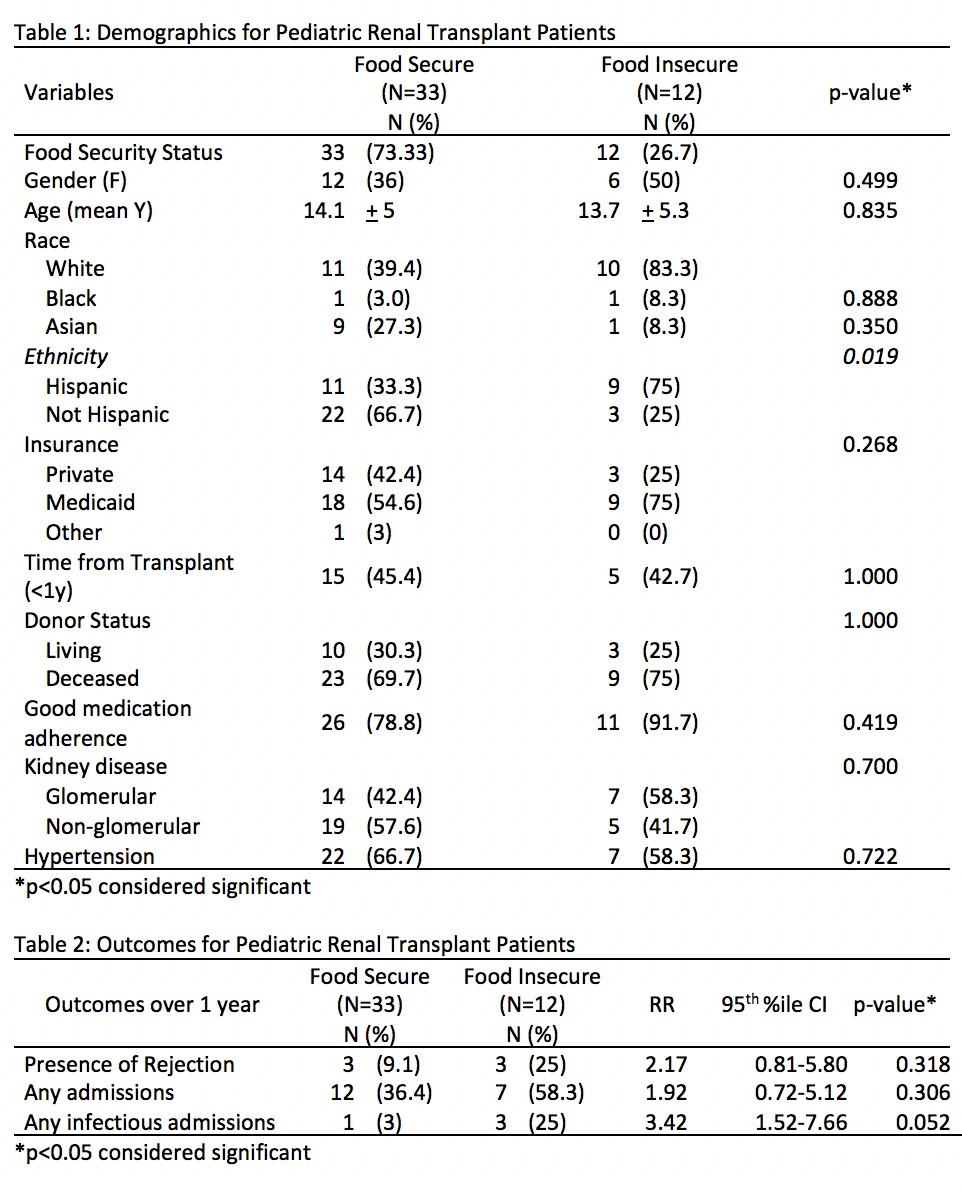Food Insecurity and Impact on Transplant Outcomes in Pediatric Kidney Transplant Recipients
A. Moin, P. Verghese, R. Engen, D. Matossian
Pediatric Nephrology, Lurie Children's Hospital, chicago, IL
Meeting: 2021 American Transplant Congress
Abstract number: LB 80
Keywords: Outcome, Pediatric, Psychosocial, Rejection
Topic: Clinical Science » Kidney » Kidney: Pediatrics
Session Information
Session Name: Kidney: Pediatrics
Session Type: Poster Abstract
Session Date & Time: None. Available on demand.
Location: Virtual
*Purpose: Food insecurity (FI), defined as inconsistent access to food or worry over shortage of food that prevents an active and healthy life, has not been studied in pediatric kidney transplant (pedsKTx) recipients. The COVID-19 pandemic increased prevalence of FI in children from 17.4% to 19.9% incentivizing this single-center retrospective cohort study in the largest pediatric hospital in Illinois, to assess for FI prevalence in pedsKTx and association with transplant outcomes.
*Methods: A 2-question survey was administered to all pediatric kidney recipients that attended the kidney transplant clinic in person or via telemedicine for the month of November 2020. All families were asked if they were ever worried that food would run out or if food ever ran out over the past year. Sociodemographic and clinical data from December 2019 to November 2020 were collected using electronic health records.
*Results: FI was identified in 12/45(26.7%) pedsKTx patients. Hispanic ethnicity (RR 3.75 (95th%ile CI 1.16-12.04), p= 0.019) was associated with FI. FI patients were more often on Medicaid vs private insurance (75% vs. 54%) and received deceased vs living donations (75 % vs. 69%), although not statistically significant possibly due to small numbers. Age, gender, race, time from transplant, good medication adherence, type of underlying renal disease and presence of hypertension were not significantly associated with FI status. Rejection episodes (25% vs. 9%) and hospital admissions (58.3% vs. 36.4%) were not significantly associated with FI although infectious hospitalizations trended towards significance (25% vs. 3%, p=0.05).
*Conclusions: Food insecurity is prevalent in pediatric renal transplant patients. Hispanic patients are more likely to be food insecure. The pandemic effect on magnifying prevalent racial and ethnic disparities in pediatric kidney transplant requires a larger sample size.
To cite this abstract in AMA style:
Moin A, Verghese P, Engen R, Matossian D. Food Insecurity and Impact on Transplant Outcomes in Pediatric Kidney Transplant Recipients [abstract]. Am J Transplant. 2021; 21 (suppl 3). https://atcmeetingabstracts.com/abstract/food-insecurity-and-impact-on-transplant-outcomes-in-pediatric-kidney-transplant-recipients/. Accessed February 16, 2026.« Back to 2021 American Transplant Congress

